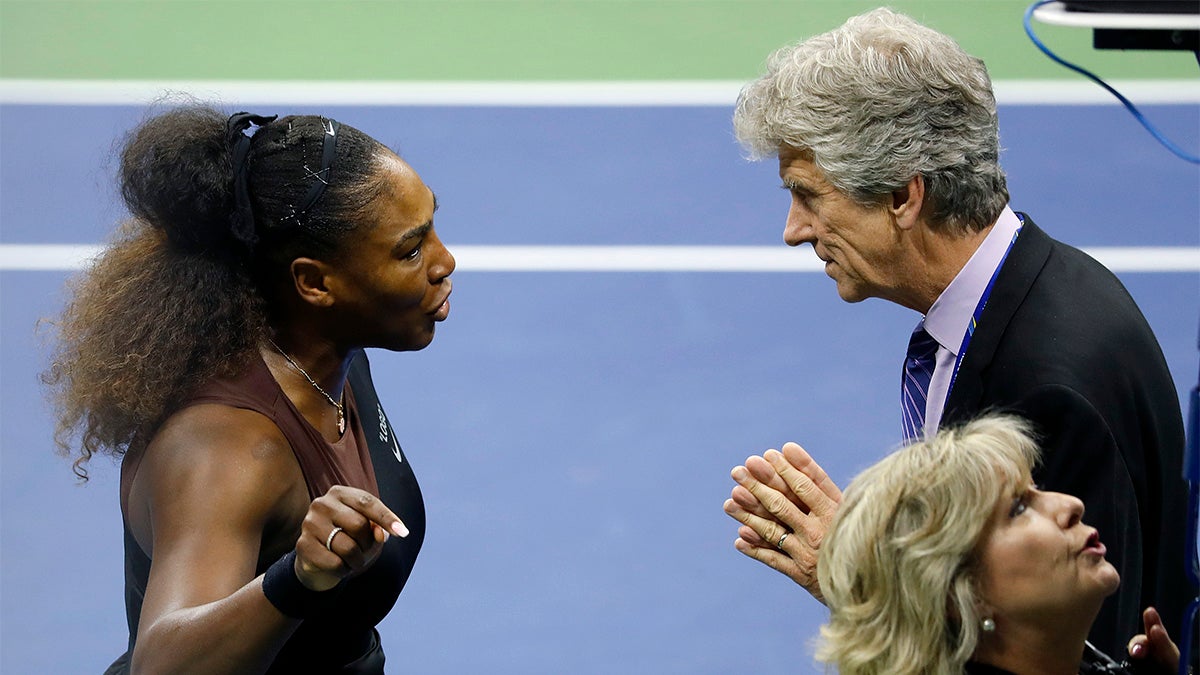Opinion: U.S. Open women's final a microcosm of societal change

Naomi Osaka’s U.S. Open Championship victory over Serena Williams was a complex combination of events that broadly laid out some of the lessons from the world of sport for all. I was there and needed a couple of days of distance, and watching and listening to the clips, to really sort through much of what the match meant. To me, apart from the success of a fantastic athlete and the battle by one of the greatest athletes of all time, my key takeaways focus on transition, patriotism, diversity, sexism, rules, technology and respect.

Transition. It is a process that happens for all in every sector of life. We are still surprised when a Peyton Manning, Derek Jeter, Willie Mays or name your favorite superstar of the past, is actually done. Or when we realize LeBron is now in his 30s. No matter what Serena or we do, one day it will be time to move on. There will always be a new kid. I hope she is not seeing it as her time yet, but transition and the arrival of youthful successors is inevitable. Yep, even Tom Brady will be done one day. But something in us does desire to see our stars play, at a high level, as long as possible. Longevity is why many of us loved George Blanda who played football for 26 seasons, retiring at 48 years old or George Foreman who won the heavyweight boxing title at 45. Not so much did we enjoy a Muhammad Ali staying in the ring too long and that horrible beating by his former sparring partner Larry Holmes. A transition in tennis royalty is underway.
Patriotism. It was the American woman vs. the Japanese woman. It is these global encounters where America pushes past race to nationality. We saw this most memorably with Jesse Owens in the 1936 Olympics and with Joe Louis defeating Max Schmeling in 1938 or even Jim Thorpe, a Native American, in the 1912 Olympics. We have to go back to the great Jack Johnson, the world heavyweight champion from 1908-1915, for a vivid moment where race would trump citizenship in the United States. Anyone from any country who beat Jack Johnson would have delighted most of America.
Diversity. Two black women playing on a tennis court is no longer novel. Last year we had Madison Keys and Sloane Stephens on the same court for the title. We have been served plenty of Venus and Serena playing each other over the years. Naomi Osaka, for her part however, is delivering a global racial diversity moment. In a country where historically racial purity has been a challenge, a Japanese woman with a Haitian father can’t help but have a modest American ideal of looking beyond race impact.
Sexism. “You stole a point from me, you’re a thief.” Sport and society, on so many levels, continues to have a gender problem. Serena’s comments in the heat of the moment, highlighted the reality: “There are men out here that do a lot worse, but because I’m a woman, you’re going to take this away from me? That is not right.”
Billie Jean King tweeted: “When a woman is emotional, she’s ‘hysterical’ and she’s penalized for it. When a man does the same, he’s ‘outspoken’ and there are no repercussions. Thank you, @serenawilliams, for calling out this double standard.”
Needless to say, not all agree with this interpretation. There is much on social media stating that Williams was out of line and was rightly penalized for her remarks. I lean towards the conclusion that a man would not have been penalized as severely as Serena was for the compounded violation of calling the official, Carlos Ramos, a thief. Should you disagree, that is the nature of interpreting when any of the “isms” are at play.
Rules. Those damn rules always get in the middle of a free-for-all competition. There is a sentiment that in big competitions, in whatever sport, to just let the players play with minimal interference from the officials. But we need rules, it’s that "Law & Order" prosecutorial discretion that we battle about. We want consistency and at the margins with rules and laws that require judgment, that’s just not possible. Chris Evert spoke for the entire crowd and television audience when she said, “I’ve been in tennis a long time, and I’ve never seen anything like it.”
Technology. If you don’t have it you might miss out. Those in the stadium with smartphones or little devices given out at the event by American Express at their marketing stations heard that blow by blow between Serena and the officials. Those of us having a device free sporting event outing were pining for our wide screens. It’s a tricky thing. Usually there is an effort across sport to entice people to come to events live, to get a little something extra. I felt like I was missing out by not having talking heads telling me what was going on. Because I didn’t stop by the American Express booth I missed many of the heat of the moment details. Oh, maybe that’s it, don’t walk by the American Express kiosk next time?
(2/2) When a woman is emotional, she’s “hysterical” and she’s penalized for it. When a man does the same, he’s “outspoken” & and there are no repercussions. Thank you, @serenawilliams, for calling out this double standard. More voices are needed to do the same.
— Billie Jean King (@BillieJeanKing) September 9, 2018
Respect. We all want it. Serena’s demand for an apology highlighted this now rightly labeled human desire. Aretha’s passing has even more deeply infused that need into our lives. “You owe me an apology.” Some see this as a millennial issue. Serena is near millennial but this whole idea of apologies is what everyone wants, and the closer to the ‘hood you are the more you demand it is respect.
The line that I love from Serena: "I don't cheat to win, I'd rather lose. I'm just letting you know."
In the end, somehow this match is resonating as more than a battle between a rising star and a veteran making an amazing return following the birth of her first child. Serena chose a course of action that many are criticizing. The issue she raises, gender equity, is one where we still need constant vigilance. Importantly too, we do need to, as Serena turned us to at the final ceremony, celebrate the victory by our latest star — Naomi Osaka.
Kenneth L. Shropshire is the CEO of the Global Sport Institute and adidas Distinguished Professor of Global Sport as Arizona State University and Endowed Professor Emeritus at the Wharton School, University of Pennsylvania. Among his 13 books is Sport Matters: Leadership Power and the Quest for Respect in Sports.
Related Articles
Serena Williams: The cost, benefit of being a strong, black female athlete

